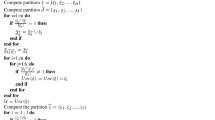Abstract
Most of the existing discretization approaches discrete each continuous attribute independently, without considering the discretization results of other continuous attributes. Therefore, some unreasonable and superfluous discretization split points are usually created. Based on compatibility rough set model and genetic algorithm, a global discretization approach has been provided. The experimental results indicate that the global discretization approach proposed can significantly decrease the number of discretization split points and the number of rules, but increase the predictive accuracy of the classifier.
Preview
Unable to display preview. Download preview PDF.
Similar content being viewed by others
References
De Jong, K.: Analysis of the Behavior of a Class of Genetic Adaptive System. Ph.D. Thesis, Department of Computer and Communications Sciences, University of Michigan, Ann Arbor, ML (1975)
Fayyad, U., Irani, K.B.: Multi-Interval Discretization of Continuous Attributes as Preprocessing for Classification Learning. In: Proceedings of the 13th International Join Conference on Artificial Intelligence, pp. 1022–1027. Morgan Kaufmann Publishers, San Francisco (1993)
Grefenstette, J.J.: Technical Report CS-83-11, Computer Science Department, Vanderbilt University (1984)
Hong, J.R.: Learning from Examples and a Multi-Purpose Learning System AE5. Chinese Journal of Computers 12, 98–105 (1989)
Kerber, R.: ChiMerge: Discretization of Numeric Attributes. In: Proceedings 10th National Conference on Artificial Intelligence, pp. 123–127. MIT Press, Cambridge (1992)
Krawiec, K., Slowinski, R., Vanderpooten, D.: Construction of Rough Classifiers Based on Application of a Similarity Relation. In: Proceedings of the 4th International Workshop on Rough Sets, Fuzzy Sets and Machine Discovery, Tokyo, Japan (1996)
Kretowski, M., Stepaniuk, J.: Decision System Based on Tolerance Rough Sets. In: Proceedings of the 4th International Workshop on Intelligent Information Systems, Augustow, Poland (1995)
Lenarcik, A., Piasta, Z.: Minimizing the Number of Rules in Deterministic Rough Classifiers. In: Lin, Y.Y., Wildberge, A.M. (eds.) Soft Computing, San Diego, pp. 32–35 (1995)
Nguyen, H.S.: Discretization of Real Value Attribute: Boolean Reasoning Approach. Ph.D. Thesis, Warsaw University (1997)
Pawlak, Z.: Rough Sets: Theoretical Aspects of Reasoning about Data. Kluwer Academic Publishers, Boston (1991)
Mollestad, T., Skowron, A.: A Rough Set Framework for Data Mining of Propositional Default Rules. In: Michalewicz, M., Raś, Z.W. (eds.) ISMIS 1996. LNCS, vol. 1079. Springer, Heidelberg (1996)
Murphy, P.M.: UCI Repository of Machine Learning Database and Domain Theories, At http://www.ics.uci.edu/~mlearn/ML/Repository.html
Slowinski, R., Vanderpooten, D.: Similarity Relation as a Basis for Rough Approximations. In: Proceedings of the Second Annual Joint Conference on Information Sciences, Wrightsville Beach, N. Carolina, USA, pp. 249–250 (1995)
Shan, N., Hamilton, H.J., Ziarko, W., Cercone, N.: Discretization of Continuous Valued Attributes in Attribute-Value Systems. In: Proceedings of the fourth International Workshop on Rough Sets, Fuzzy Sets and Machine Discovery, Tokyo, Japan, pp. 74–81 (1996)
Wu, X.D.: A Bayesian Discretizer for Real-Valued Attributes. The Computer Journal 39, 688–691 (1996)
Yao, Y.Y., Wong, S.K.M.: Generalization of Rough Sets Using Relationships Between Attribute Values. In: Proceedings of the Second Annual Joint Conference on Information Sciences, Wrightsville Beach, N. Carolina, USA, pp. 30–33 (1995)
Author information
Authors and Affiliations
Editor information
Editors and Affiliations
Rights and permissions
Copyright information
© 1999 Springer-Verlag Berlin Heidelberg
About this paper
Cite this paper
Sun, L., Gao, W. (1999). The Discretization of Continuous Attributes Based on Compatibility Rough Set and Genetic Algorithm. In: Zhong, N., Skowron, A., Ohsuga, S. (eds) New Directions in Rough Sets, Data Mining, and Granular-Soft Computing. RSFDGrC 1999. Lecture Notes in Computer Science(), vol 1711. Springer, Berlin, Heidelberg. https://doi.org/10.1007/978-3-540-48061-7_23
Download citation
DOI: https://doi.org/10.1007/978-3-540-48061-7_23
Publisher Name: Springer, Berlin, Heidelberg
Print ISBN: 978-3-540-66645-5
Online ISBN: 978-3-540-48061-7
eBook Packages: Springer Book Archive




